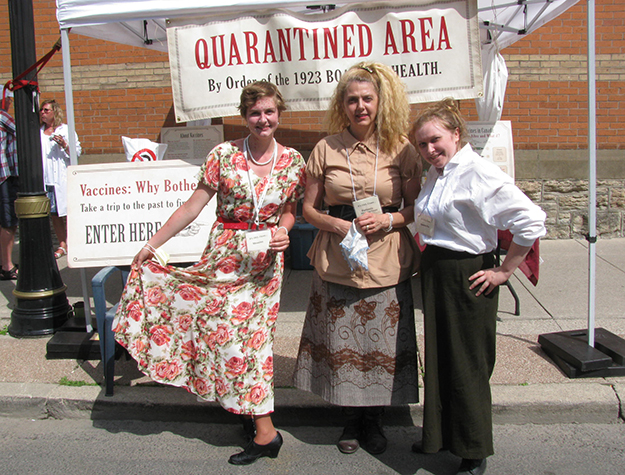Visitors from the past communicate importance of vaccinations

From left to right: Rachel Gysbers, a graduate student in Biochemistry, played a person with measles; Lydia Garland, program administrator at the Health Policy PhD Program at CHEPA at McMaster, played someone with whooping cough; and Nicole Archer, a first-year student in the Faculty of Health Sciences, played a patient suffering from the 1918 flu pandemic.
Why bother with vaccinations?
Three members of the McMaster community volunteered their time last weekend to answer that question at the Quarantine Tent.
The interactive display allowed visitors to meet people transported from the past who, by today’s standards, have vaccine-preventable diseases. It was hosted by Hamilton Public Health Services (HPHS), and took place at this year’s Open Streets Hamilton festival on James Street North.
At the Quarantine Tent, visitors met actors (a mix of students and healthcare professionals) who played patients with diseases such as diphtheria, polio and smallpox. The actors also communicated how the diseases affected families and communities from past eras.
The last case of smallpox in Canada occurred in 1967 from an infected Canadian returning from Brazil. A phenomenal success story of vaccination, smallpox was eliminated worldwide in 1979.
Vaccination is also credited with lowering the numbers of whooping cough cases substantially. Consider that in 1943 there were 19,878 cases (156 per 100,000 people) in Canada. But with vaccination now being common, Canada sees a much smaller number of cases — about 4,700 each year.
The Quarantine Tent also featured polio, measles and the notorious 1918 flu pandemic.
What would society look like without vaccines? All of the above diseases (except smallpox) are still around, and if vaccination rates drop they could make a serious comeback.
Read more about McMaster’s efforts to combat drug-resistant pathogens.

